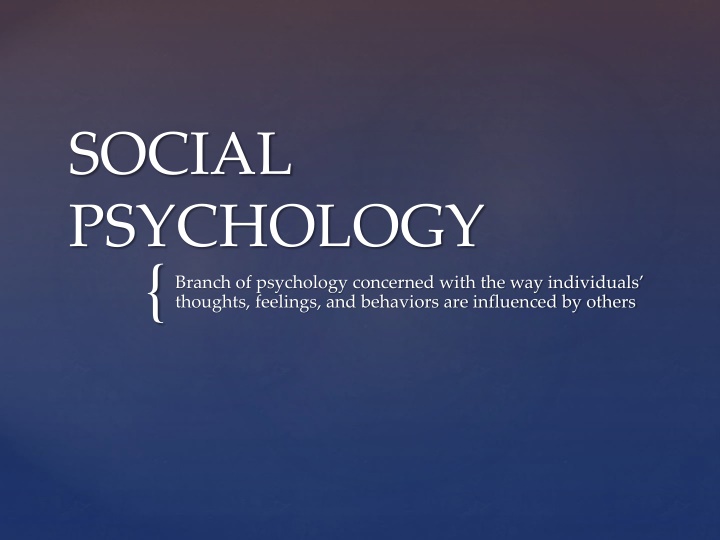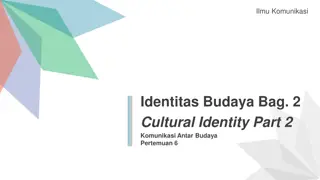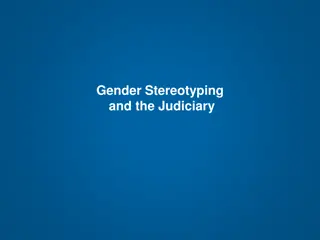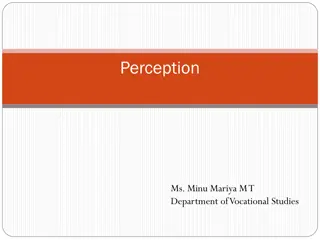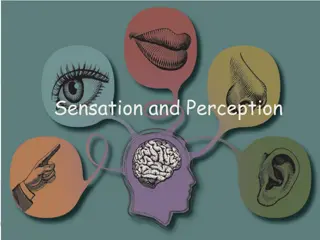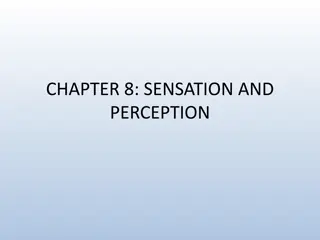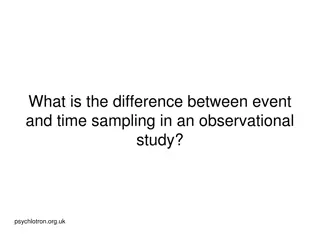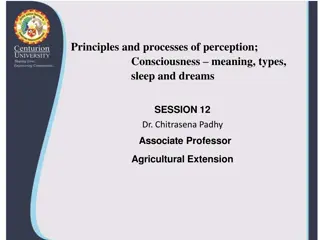Insights into Social Psychology: Perception, Stereotyping, and Attribution
Social psychology explores how individuals are influenced by others, touching upon person perception, effects of physical appearance, cognitive schemas, stereotypes, ingroup/outgroup dynamics, and attribution processes. Factors like physical appearance and cognitive schemas shape our perceptions, often leading to stereotypes and illusory correlations. Understanding these processes can help differentiate friend from foe and shed light on biases and attributions individuals make.
Uploaded on Sep 17, 2024 | 1 Views
Download Presentation

Please find below an Image/Link to download the presentation.
The content on the website is provided AS IS for your information and personal use only. It may not be sold, licensed, or shared on other websites without obtaining consent from the author.If you encounter any issues during the download, it is possible that the publisher has removed the file from their server.
You are allowed to download the files provided on this website for personal or commercial use, subject to the condition that they are used lawfully. All files are the property of their respective owners.
The content on the website is provided AS IS for your information and personal use only. It may not be sold, licensed, or shared on other websites without obtaining consent from the author.
E N D
Presentation Transcript
SOCIAL PSYCHOLOGY { Branch of psychology concerned with the way individuals thoughts, feelings, and behaviors are influenced by others
DEF: the process of forming impressions of others Factors that influence perception: physical appearance, cognitive schemas, stereotypes, and subjectivity PERSON PERCEPTION
We attach desirable personality characteristics to the good looking We tend to view the attractive as more intelligent Baby-faced people are seen as honest, submissive, and na ve Chameleon effect: tendency to unintentionally mimic other s movements EFFECTS OF PHYSICAL APPEARANCE
Social schemas: organized clusters of ideas about categories of social events and people Helps to process info COGNITIVE SCHEMAS
DEF: widely held beliefs that people have certain characteristics b/c of their membership in a particular group Commonly based on sex, age, ethnic, or occupational group Broad overgeneralizations; inaccurate STEREOTYPES
Illusory correlation: when people estimate that they have encountered more confirmations of an association btwn social traits than they have actually seen We recall facts that fit our schemas and stereotypes SUBJECTIVITY IN PERSON PERCEPTION
Helps to separate friend from foe Ingroup: a group that one belongs to and identifies with Outgroup: group that on does not belong to or identify with EVOLUTIONARY PERSPECTIVE ON BIAS
ATTRIBUTION PROCESSES { Attributions are inferences that people draw about the causes of events, others behavior, and their own behavior
Internal attributions: ascribe the causes of behavior to personal dispositions, traits, abilities, and feelings External attributions: ascribe the causes of behavior to situational demands and environmental constraints INTERNAL VS. EXTERNAL
Harold H. Kelley Assumes that people attribute behavior to factors that are present when the behavior takes place and absent when it does not Consider 3 types of info: 1) Consistency 2) Distinctiveness 3) Consensus KELLEY S COVARIATION MODEL
Bernard Weiner Believes people often focus on the stability of the causes underlying behavior Stable-unstable dimension to attribution ATTRIBUTIONS FOR FAILURE AND SUCCESS
Fundamental attribution error: observers bias in favor of internal attributions in explaining others behavior Observers may not know history of actor to make correct judgment about the behavior being seen ACTOR-OBSERVER BIAS
DEF: tendency to blame victims for their misfortune, so that one feels less likely to be victimized in a similar way Attributes negative traits on the victim DEFENSIVE ATTRIBUTION
DEF: tendency to attribute ones success to personal factors and one s failures to situational factors Observers attribute your failures to your internal factors; actor will blame external factors SELF-SERVING BIAS
Cultural differences in individualism and collectivism Individualism: putting personal goals ahead of group goals and defining one s identity in terms of personal attributes rather than group membership Collectivism: putting group goals ahead of personal goals and defining one s identity in terms of the groups one belongs to CULTURE & ATTRIBUTION
CLOSE RELATIONSHIPS: LIKING AND LOVE Interpersonal attraction refers to positive feelings toward another {
Physical attractiveness influences course of commitment Matching hypothesis: proposes that males and females of approximately equal physical attractiveness are likely to select each other as partners PHYSICAL ATTRACTIVENESS
Do opposites attract? NO Couples tend to be similar in almost every aspect SIMILARITY EFFECTS
Reciprocity: liking those who show that they like you Flattery will get you somewhere Couples will tend to idealize their partner RECIPROCITY EFFECTS
PERSPECTIVES ON THE MYSTERY OF LOVE { Blah, blah, blah
DEF: a complete absorption in another that includes tender sexual feelings and the agony and ecstasy of intense emotion PASSIONATE LOVE
DEF: warm, trusting, tolerant affection for another whose life is deeply intertwined with one s own Divided into: Intimacy: warmth, closeness, and sharing in a relationship Commitment: intent to maintain a relationship in spite of the difficulties and costs that may arise COMPANIONATE LOVE
Cindy Hazan and Phillip Shaver Attachment to caregiver as an infant translates to romantic relationships in adulthood Secure-attachment leads to secure relationships Anxious-ambivalent = intensely emotional relationships Avoidant = casual sex LOVE AS ATTACHMENT
Passionate love in a romantic relationship is not a pan-cultural emphasis Arranged marriages still exist today CULTURE AND CLOSE RELATIONSHIPS
